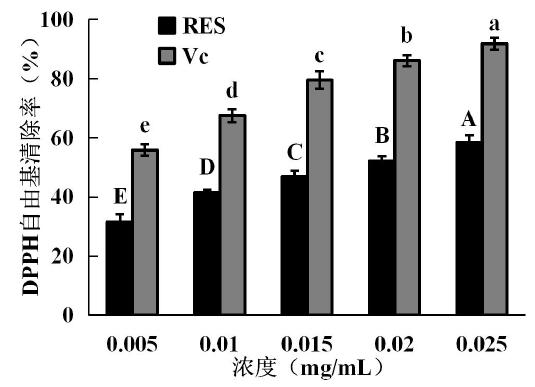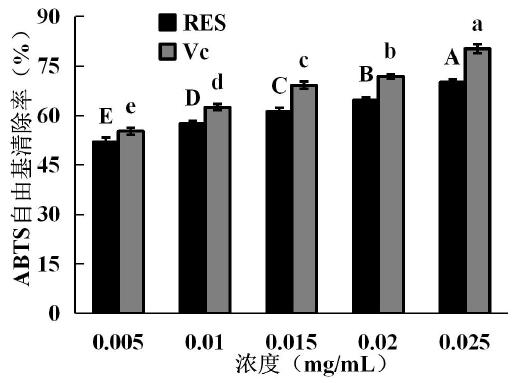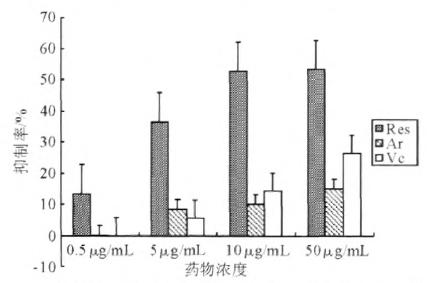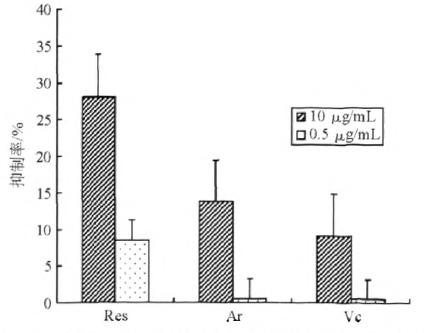Resveratrol , also known as astragalus triflorus, is a non-flavonoid polyphenolic compound, which is a plant defense element produced when plants are attacked by pathogenic microorganisms such as fungi and bacteria or when the environment deteriorates such as UV radiation and other unfavorable conditions. Resveratrol is widely found in peanuts, grapes, pineapples, quinoa, thuja and other plants, and is a natural antioxidant.
Pharmacological effects
Resveratrol has an inhibitory effect on Staphylococcus aureus, Escherichia coli, Pseudomonas aeruginosa, etc. The MIC (minimum inhibitory concentration) for Staphylococcus aureus is 0.512 mg/ml.
Antioxidant
Resveratrol acts as an antioxidant by enhancing hydrogen peroxide tolerance and inhibiting cyclooxygenase-2 (COX-2). And it can significantly reduce reactive oxygen species (ROS) and free radicals generated by stress, thus protecting the body from oxidative damage.
In 2021, Pengcheng Wu et al. extracted resveratrol from peanut buds and investigated the scavenging ability of resveratrol on free radicals DPPH and ABTS by comparing it with vitamin C (VC).

Figure 1 Scavenging of DPPH by resveratrol (RES) and VC

Figure 2 Clearance of ABTS by resveratrol (RES) and VC
As shown in Figures 1 and 2, RES extracted from peanut sprouts had a strong scavenging effect on DPPH radicals and ABTS radicals, but its scavenging ability was slightly lower than that of vitamin C. This may be caused by the lower purity of RES in the purified peanut sprouts.
Photoprotective effect
Liu Hongxia et al. investigated the effect of UV light on DNA breakage damage in skin keratin-forming cells (HaCaT cells) and the protective effect of resveratrol. METHODS: Comet electrophoresis was used to study the DNA damage effect of UV radiation at irradiation doses of 0-90 mJ/cm² and the protective effect of resveratrol pretreatment at different concentrations (0.1, 1.0, and 10.0 μmol/L). In the environment of lysate of comet electrophoresis, under the action of voltage, the DNA in undamaged nuclei stayed in the nuclear matrix due to its large molecular weight and fluorescently stained without trailing tails in a round shape; while the damaged DNA unstranded and migrated toward the anode, forming trailing tails in the shape of comets, and the longer the trailing tails, the stronger the fluorescence of the tails and the more severely damaged DNA.
Resveratrol can protect DNA from DNA breakage damage caused by UV radiation. Resveratrol extract powder
can slow down the process of skin damage and aging caused by UVB irradiation by inhibiting the growth of MMP-1 levels in human skin fibroblasts caused by UVB irradiation, resulting in a reduction in the breakdown of collagen in the skin dermal tissue. Resveratrol can also reduce the apoptosis rate of UVB irradiated cells, which has a certain protective effect on cells.
Whitening
Shi Xianmin et al. studied the effects of resveratrol on the proliferation of B16 melanocytes, intracellular tyrosinase activity and melanin synthesis.

Figure 3 Inhibitory effect of resveratrol on tyrosinase in B16 cells (Res: resveratrol, Ar: arbutin, Vc: VC ethyl ether)
The results showed that resveratrol had a better inhibitory effect on intracellular tyrosinase in B16 cells compared with arbutin and VC ethyl ether. The inhibitory effect of resveratrol on tyrosinase at a concentration of 0.5 μg/ml, i.e., comparable to that of arbutin at a concentration of 50 μg/ml.

Figure 4 Effect of resveratrol on melanin content in B16 cells
The data in Figure 4 show that the inhibitory effect of resveratrol on melanin synthesis in B16 cells was much better than that of arbutin and VC ethyl ether at both concentrations of 10 μg/ml and 0.5 μg/ml. The inhibitory effect of resveratrol on melanin synthesis at 0.5 μg/ml was comparable to that of VC ethyl ether at 10 μg/ml.
Resveratrol has a certain inhibitory effect on the proliferation of B16 melanocytes and intracellular tyrosinase, thus reducing melanin synthesis and providing a whitening effect.